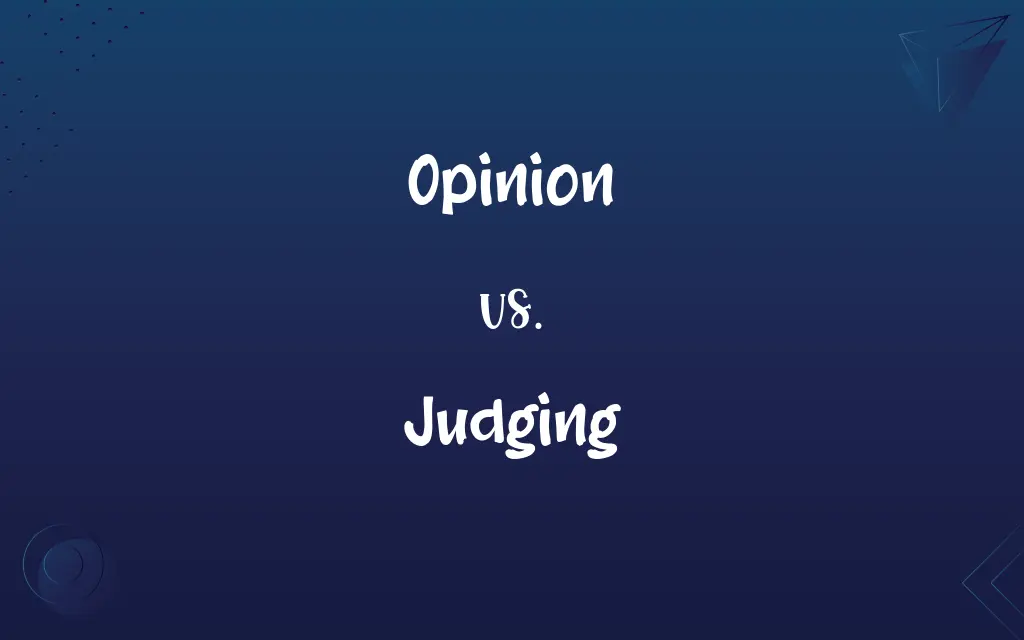Opinion vs. Judging: Know the Difference

By Hifza Nasir & Shumaila Saeed || Published on April 19, 2024
Opinion involves expressing a personal view or belief, often subjective; judging entails making a decision or forming a conclusion, typically with authority or after evaluation.

Key Differences
Opinion is sharing one's perspective or belief about something, which can be based on personal feelings, tastes, or experiences. It's subjective and varies from person to person. Judging, however, involves evaluating or assessing something or someone, often leading to a decision or verdict. It can be based on criteria, evidence, or standards.
Shumaila Saeed
Apr 19, 2024
Opinions are personal and can be about preferences without the need for justification, judging usually requires a rationale or set of criteria. Opinions are often shared in casual conversations or debates, reflecting individual viewpoints. In contrast, judging is more formal and associated with making informed assessments or decisions, such as in a court or competition.
Hifza Nasir
Apr 19, 2024
The act of giving an opinion does not inherently carry the authority to determine outcomes, whereas judging often implies a level of authority, expertise, or the power to influence outcomes based on the judgment. Opinions can be about anything and need not be informed or educated, while judging typically involves a process of consideration and deliberation.
Shumaila Saeed
Apr 19, 2024
Opinions can foster dialogue and understanding, as they offer insight into personal values and beliefs. Judging, on the other hand, leads to a conclusion or resolution, affecting the subject being judged. The distinction highlights different roles in communication and decision-making processes.
Hifza Nasir
Apr 19, 2024
Understanding the difference is crucial in interactions, as expressing an opinion is part of everyday conversation, while judging involves a more formal evaluation with potential consequences for the judged party. This distinction underlines the importance of context and intent in communication and assessment.
Dua Fatima
Apr 19, 2024
ADVERTISEMENT
Comparison Chart
ADVERTISEMENT
Opinion and Judging Definitions
Judging
Evaluating based on criteria.
She is judging the baking contest this weekend.
Hifza Nasir
Feb 28, 2024
Judging
Making a decision or conclusion.
Judging from the evidence, the defendant is guilty.
Hifza Nasir
Feb 28, 2024
Opinion
Belief not based on certainty.
Her opinion on climate change is well-known.
Shumaila Saeed
Feb 28, 2024
ADVERTISEMENT
Judging
Determining outcomes.
The panel will be judging the proposals today.
Shumaila Saeed
Feb 28, 2024
Judging
Forming an opinion with authority.
He was judging the applicants harshly.
Shumaila Saeed
Feb 28, 2024
Judging
Assessment with potential consequences.
Judging the situation, it's better to wait.
Hifza Nasir
Feb 28, 2024
Opinion
A belief or conclusion held with confidence but not substantiated by positive knowledge or proof
"The world is not run by thought, nor by imagination, but by opinion" (Elizabeth Drew).
Hifza Nasir
Feb 28, 2024
Judging
To form an opinion or estimation of after careful consideration
Judge heights.
Judging character.
Hifza Nasir
Feb 28, 2024
Opinion
A judgment based on special knowledge and given by an expert
A medical opinion.
Hifza Nasir
Feb 28, 2024
Opinion
A judgment or estimation of the merit of a person or thing
Has a low opinion of braggarts.
Hifza Nasir
Feb 28, 2024
Judging
To act as one appointed to decide the winners of
Judge an essay contest.
Hifza Nasir
Feb 28, 2024
Opinion
A court's formal, usually written statement explaining its reasons for its decision in a case.
Hifza Nasir
Feb 28, 2024
Judging
To determine or declare after consideration or deliberation
Most people judged him negligent in performing his duties as a parent.
Shumaila Saeed
Feb 28, 2024
Opinion
An attorney's formal, usually written statement giving an assessment of how the law should be or is likely to be applied in a particular situation.
Shumaila Saeed
Feb 28, 2024
Opinion
A piece of testimony that is not usually admissible when given by a layperson, as in contrast to an opinion given by an expert witness.
Dua Fatima
Feb 28, 2024
Opinion
A belief, judgment or perspective that a person has formed, either through objective or subjective reasoning, about a topic, issue, person or thing.
I would like to know your opinions on the new filing system.
In my opinion, white chocolate is better than milk chocolate.
Every man is a fool in some man's opinion.
We invite you to state your opinions about the suggestions.
Dua Fatima
Feb 28, 2024
Judging
One who makes estimates as to worth, quality, or fitness
A good judge of used cars.
A poor judge of character.
Shumaila Saeed
Feb 28, 2024
Opinion
The judgment or sentiment which the mind forms of persons or things; estimation.
Hifza Nasir
Feb 28, 2024
Repeatedly Asked Queries
What does judging involve?
Judging involves evaluating or assessing something or someone based on specific criteria or standards, often leading to a decision or conclusion.
Hifza Nasir
Apr 19, 2024
What is an opinion?
An opinion is a personal view, belief, or preference, often based on individual feelings or experiences.
Shumaila Saeed
Apr 19, 2024
Why is it important to distinguish between opinion and judging?
Distinguishing between them is crucial for understanding the basis, impact, and appropriateness of expressions in various contexts.
Dua Fatima
Apr 19, 2024
Is judging always negative?
No, judging can be positive, negative, or neutral, depending on the context and criteria used.
Hifza Nasir
Apr 19, 2024
What is the difference between an opinion and a judgment?
An opinion is a personal belief or preference, while a judgment is an evaluation or decision based on criteria and often involves authority.
Dua Fatima
Apr 19, 2024
Can opinions be wrong?
Opinions are subjective and cannot be deemed right or wrong, though they can be based on incorrect facts.
Shumaila Saeed
Apr 19, 2024
How does one form an opinion?
Opinions are formed based on personal feelings, experiences, beliefs, and information available to the individual.
Dua Fatima
Apr 19, 2024
Are opinions important in judging?
Personal opinions can influence judging, but formal judgments should ideally be based on objective criteria and evidence.
Shumaila Saeed
Apr 19, 2024
Can an opinion become a judgment?
An opinion can influence a judgment, especially if the individual expressing the opinion has the authority to make formal decisions.
Hifza Nasir
Apr 19, 2024
What roles do opinion and judging play in decision-making?
Opinions provide perspectives, while judging involves the actual decision-making process based on evaluation.
Dua Fatima
Apr 19, 2024
How can one differentiate between expressing an opinion and making a judgment?
Expressing an opinion is sharing a personal belief without the need for it to be based on criteria, whereas making a judgment involves an assessment leading to a conclusion.
Dua Fatima
Apr 19, 2024
Can everyone judge?
While everyone can have opinions and make personal judgments, formal judging often requires expertise, authority, or a designated role.
Hifza Nasir
Apr 19, 2024
How does society view opinion and judging?
Society values opinions for personal expression and diversity of thought, while judging is recognized as necessary for decision-making and assessments.
Shumaila Saeed
Apr 19, 2024
Why is context important in understanding opinion and judging?
Context determines the appropriateness, impact, and interpretation of opinions and judgments, influencing how they are received and understood.
Hifza Nasir
Apr 19, 2024
How do opinions and judgments affect relationships?
Opinions can enhance understanding and dialogue, while judgments, especially if perceived as unfair, can strain relationships.
Hifza Nasir
Apr 19, 2024
Share this page
Link for your blog / website
HTML
Link to share via messenger
About Author
Written by
Hifza NasirCo-written by
Shumaila SaeedShumaila Saeed, an expert content creator with 6 years of experience, specializes in distilling complex topics into easily digestible comparisons, shining a light on the nuances that both inform and educate readers with clarity and accuracy.







































































